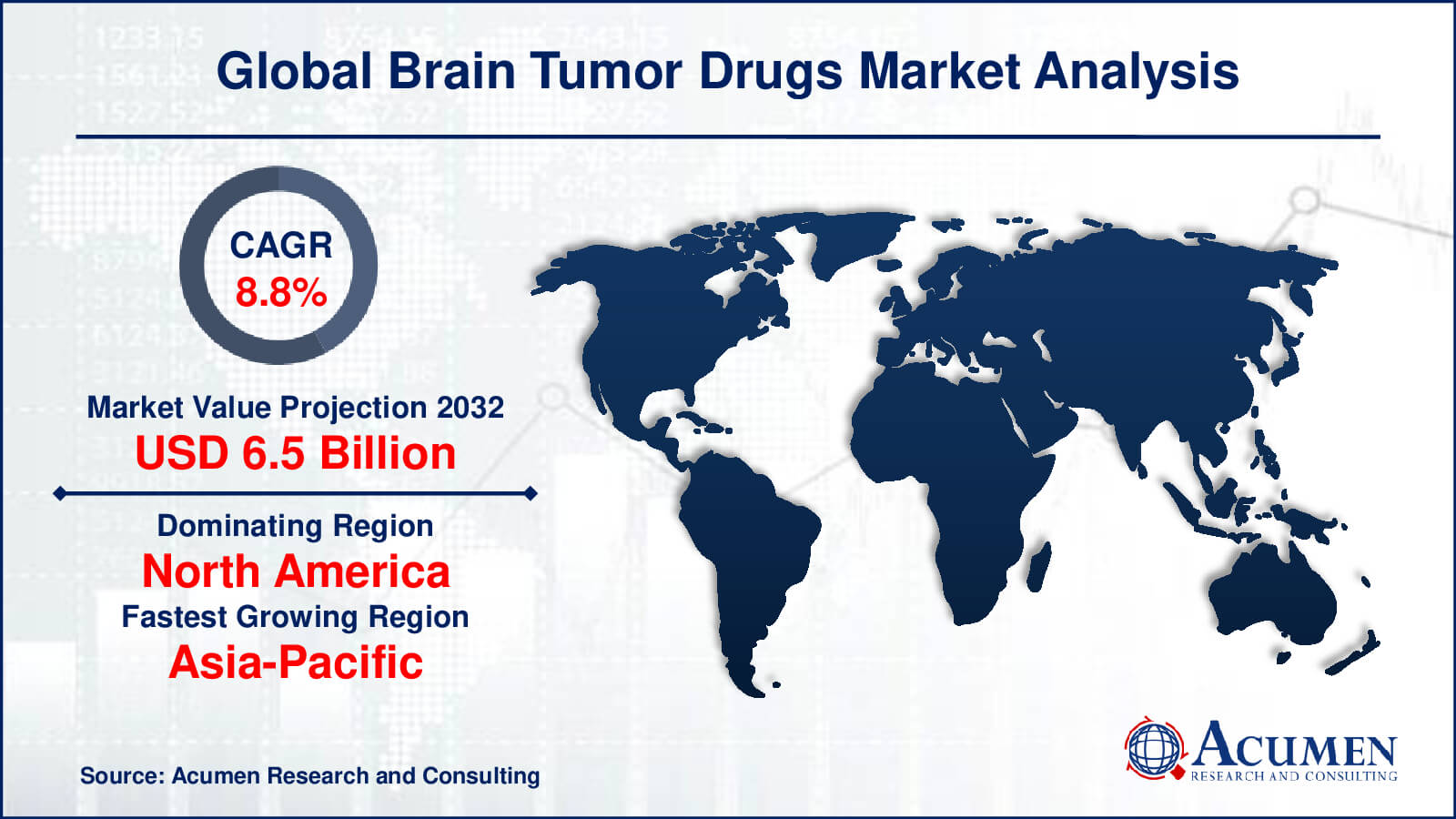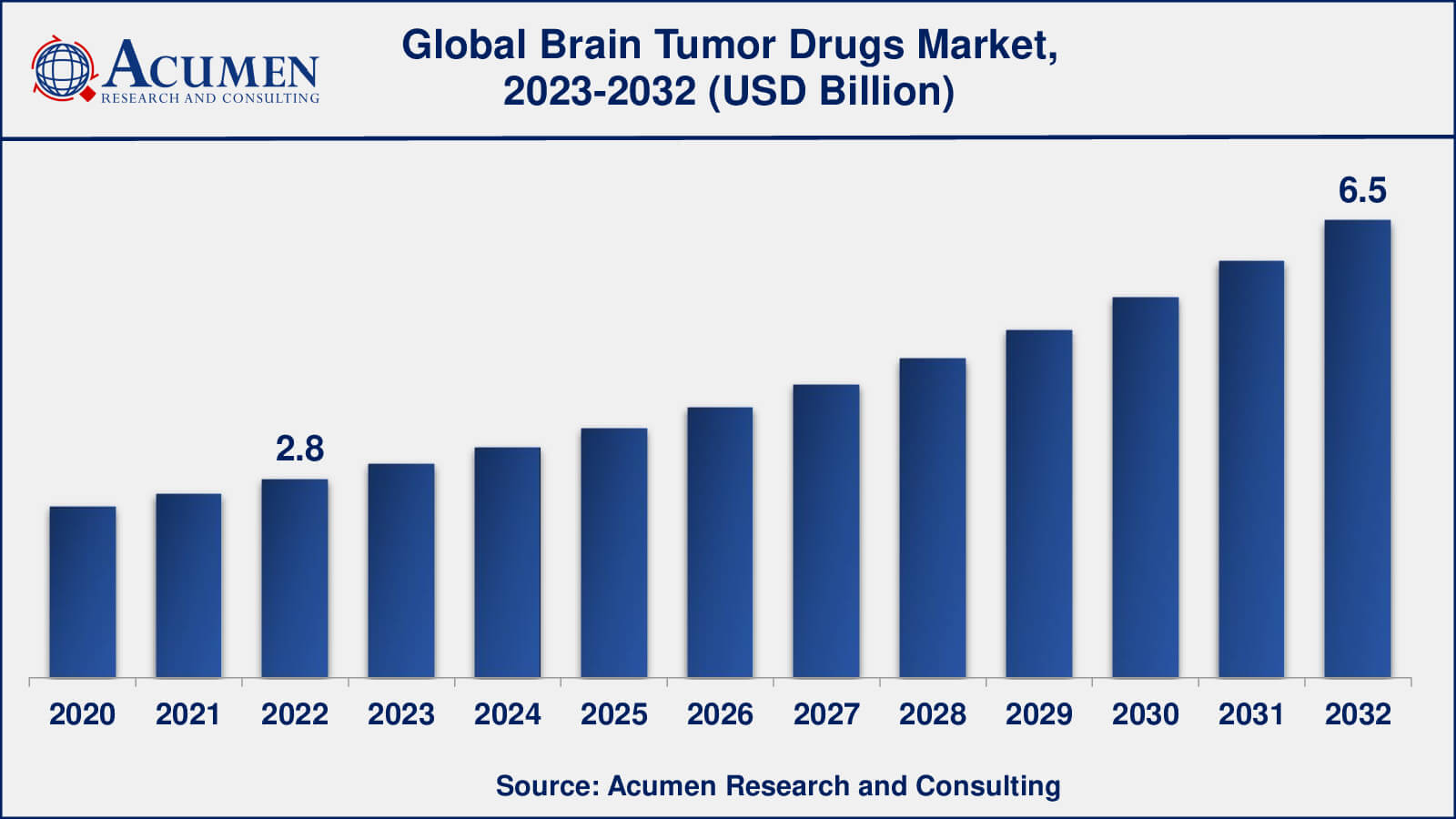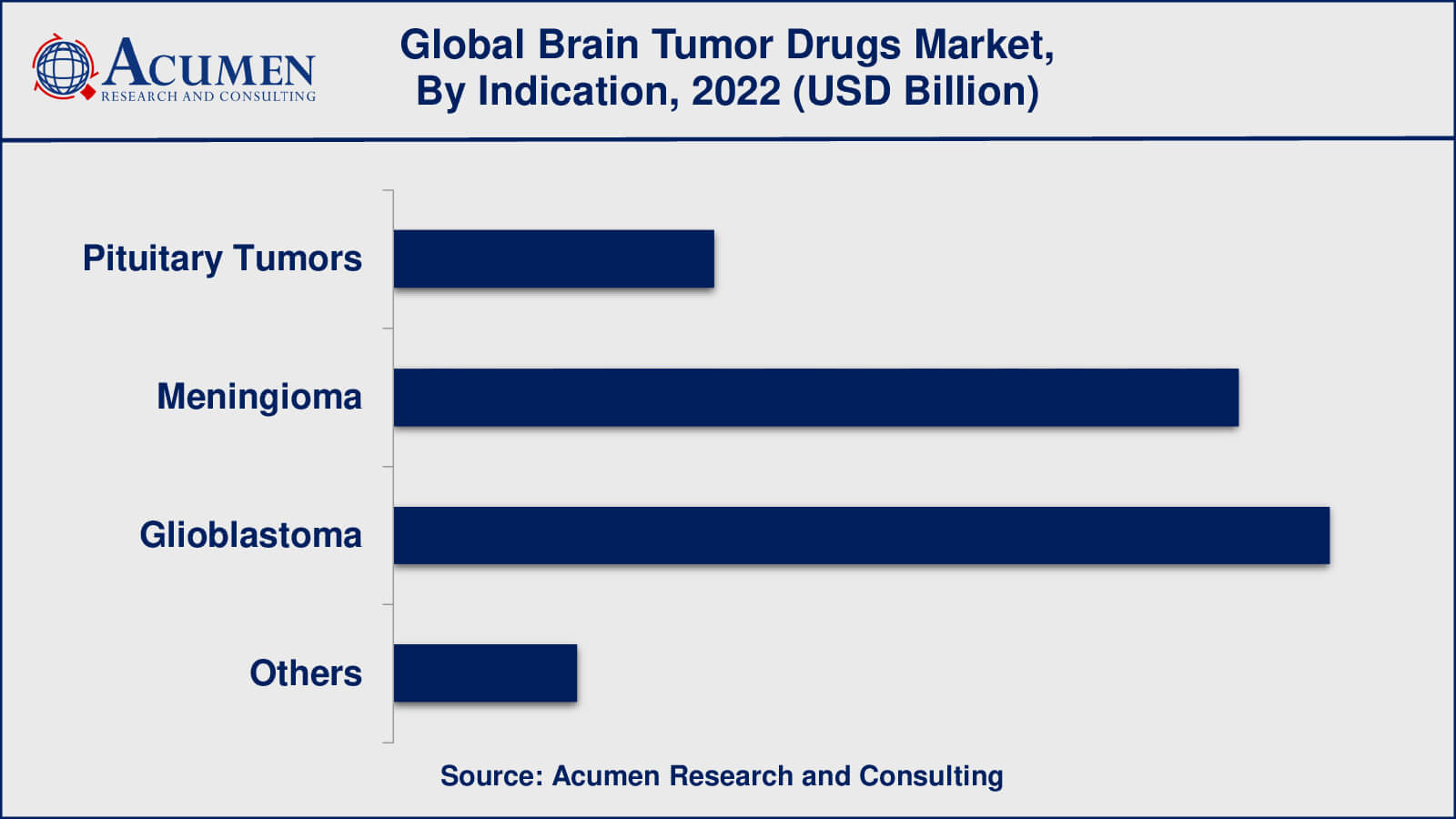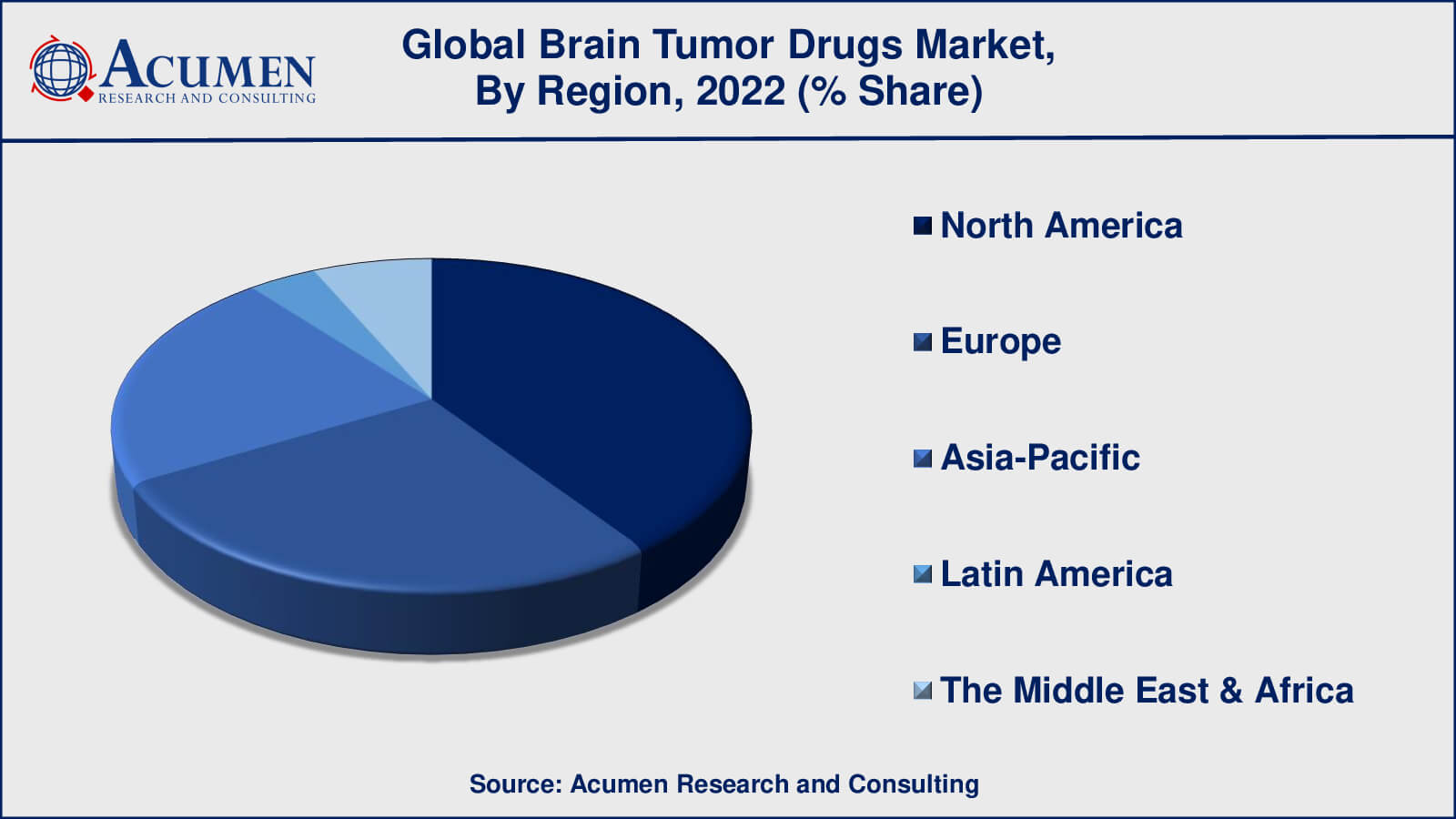Brain Tumor Drugs Market Size - Global Industry, Share, Analysis, Trends and Forecast 2023 - 2032
Published :
Report ID:
Pages :
Format :
Brain Tumor Drugs Market Size - Global Industry, Share, Analysis, Trends and Forecast 2023 - 2032
Report Coverage
- Industry Dynamics
- Market Size and Forecast Data
- Segment Analysis
- Competitive Landscape
- Regional Analysis with a Niche Focus on Country-Level Data
- High Level Analysis - Porter's, PESTEL, Value Chain, etc.
- Company Profiles of Key Players
- Option to Customize the Report As Per Your Specific Need
Request Sample Report
The Global Brain Tumor Drugs Market Size accounted for USD 2.8 Billion in 2022 and is estimated to achieve a market size of USD 6.5 Billion by 2032 growing at a CAGR of 8.8% from 2023 to 2032.
Brain Tumor Drugs Market Highlights
- Global brain tumor drugs market revenue is poised to garner USD 6.5 billion by 2032 with a CAGR of 8.8% from 2023 to 2032
- North America brain tumor drugs market value occupied more than USD 1.1 billion in 2022
- As per the National Brain Tumor Society, 700,000 Americans are currently living with primary brain tumor
- According to the American Society of Clinical Oncology, an estimated 24,810 adults in the United States will be diagnosed with primary cancerous brain and spinal cord tumors in 2023
- Asia-Pacific brain tumor drugs market growth will record a CAGR of more than 9% from 2023 to 2032
- Among therapy type, the chemotherapy sub-segment generated around US$ 1 billion revenue in 2022
- Based on indication, the glioblastoma sub-segment generated around 41% share in 2022
- Rising adoption of combination therapies is a popular brain tumor drugs market trend that fuels the industry demand

Brain tumor drugs are medications used to treat brain tumors. They work by specifically targeting molecules or pathways involved in the growth and spread of cancer cells in the brain. Brain tumor drugs have aided patients worldwide by providing an effective method of treating brain tumors. These drugs have been shown to be effective in shrinking tumors, slowing cancer cell growth, and improving overall survival rates in patients with brain tumors. Furthermore, these drugs have improved patients' quality of life by reducing symptoms such as headaches, seizures, and neurological deficits.
Chemotherapy agents, targeted therapies, and immunotherapies are some of the most commonly used brain tumor drugs. Chemotherapy agents work by killing cancer cells in the brain, whereas targeted therapies work by focusing on specific molecules or pathways involved in cancer cell growth. Immunotherapies cause the immune system to attack cancer cells.

Global Brain Tumor Drugs Market Dynamics
Market Drivers
- Increasing prevalence of brain tumors
- Technological advancements in brain tumor diagnosis
- Growing demand for personalized medicines
- Increase in healthcare expenditure
- Rising geriatric population
Market Restraints
- High cost of brain tumor drugs
- Stringent regulatory policies for drug approval
- Lack of awareness about brain tumor diagnosis and treatment
- Adverse side effects associated with brain tumor drugs
Market Opportunities
- Emergence of novel therapies for brain tumors
- Growing research and development activities in the field of brain tumor treatment
- Increasing demand for targeted therapies
Brain Tumor Drugs Market Report Coverage
| Market | Brain Tumor Drugs Market |
| Brain Tumor Drugs Market Size 2022 | USD 2.8 Billion |
| Brain Tumor Drugs Market Forecast 2032 | USD 6.5 Billion |
| Brain Tumor Drugs Market CAGR During 2023 - 2032 | 8.8% |
| Brain Tumor Drugs Market Analysis Period | 2020 - 2032 |
| Brain Tumor Drugs Market Base Year | 2022 |
| Brain Tumor Drugs Market Forecast Data | 2023 - 2032 |
| Segments Covered | By Therapy Type, By Indication, By Distribution Channel, And By Geography |
| Regional Scope | North America, Europe, Asia Pacific, Latin America, and Middle East & Africa |
| Key Companies Profiled | AbbVie Inc., Amgen Inc., AstraZeneca, Bayer AG, Bristol-Myers Squibb, Eisai Co., Ltd., Eli Lilly and Company, F. Hoffmann-La Roche Ltd, Ipsen Biopharmaceuticals, Inc., Johnson & Johnson, Merck & Co, Inc., Novartis AG, Pfizer Inc, and Sanofi SA. |
| Report Coverage |
Market Trends, Drivers, Restraints, Competitive Analysis, Player Profiling, Covid-19 Analysis, Regulation Analysis |
Brain Tumor Drugs Market Insights
Several factors, including the increasing prevalence of brain tumors worldwide, are driving the global brain tumor drugs market. The rise in the number of brain tumor cases has resulted in an increased demand for effective treatments, spurring the development of novel drugs to combat this disease. Technological advancements in brain tumor diagnosis have also aided market growth, as improved diagnostic tools have resulted in earlier detection and treatment of brain tumors. The growing demand for personalised medicines, which are designed to target specific molecular pathways involved in the growth and spread of brain tumors, is also driving the market. As a result, targeted therapies have been developed, with promising results in clinical trials.
The high cost of brain tumor drugs, on the other hand, remains a significant market challenge, as these treatments can be extremely expensive for many patients. Furthermore, stringent regulatory policies for drug approval can stifle market growth by delaying the introduction of new treatments. Lack of awareness about brain tumor diagnosis and treatment is another factor that can stymie market growth, as many patients may be unaware of the symptoms of brain tumors or the treatment options available. Adverse side effects of brain tumor medications can also limit their use in some patients.
Despite these challenges, the market for brain tumor drugs offers significant growth opportunities, owing to the emergence of novel therapies, increased R&D activities, rising demand for targeted therapies, and rising adoption of combination therapies. Overall, the global market for brain tumor drugs is expected to grow in the coming years, owing to these and other factors.
Brain Tumor Drugs Market Segmentation
The worldwide market for brain tumor drugs is split based on therapy type, indication, distribution channel, and geography.
Brain Tumor Drug Therapy Types
- Targeted Therapy
- Chemotherapy
- Immunotherapy
- Others
According to an industry analysis, chemotherapy has been the dominant therapy type in the brain tumor drugs market in recent years. Chemotherapy has also been a popular treatment option in the market for brain tumor drugs, particularly for treating aggressive brain tumors such as glioblastoma and medulloblastoma. Chemotherapy uses drugs to kill cancer cells by interfering with their ability to divide and grow. Chemotherapy agents, on the other hand, can cause damage to healthy cells in the body, resulting in side effects such as hair loss, nausea, and fatigue.
Targeted therapy, on the other hand, is expected to grow significantly in the coming years. The use of drugs that target particular molecular pathways involved in the growth as well as spread of cancer cells is known as targeted therapy. These medications are intended to be more effective and much less toxic than traditional chemotherapy agents, which can harm healthy cells in the body. In recent years, there has been an increased emphasis on the development of targeted therapies for brain tumors, particularly glioblastoma, the most common and aggressive type of brain cancer. Several targeted therapies, including bevacizumab and temozolomide, have been approved for the treatment of glioblastoma.
Brain Tumor Drug Indications
- Pituitary Tumors
- Meningioma
- Glioblastoma
- Others

In recent years, glioblastoma has dominated the market for brain tumor drugs. Glioblastoma is the most common and aggressive type of brain cancer, with a poor prognosis. As a result, much emphasis has been placed on developing effective treatments for this indication. Several targeted therapies and chemotherapy agents, including bevacizumab, temozolomide, and lomustine, have been approved for the treatment of glioblastoma. Immunotherapy is also being studied as a potential treatment option for glioblastoma, as well as several clinical trials are currently underway to assess the safety and efficacy of these therapies.
Meningioma is another common indication in the market for brain tumor drugs. Meningioma is a type of tumor that develops from the membranes that surround the brain and spinal cord, known as the meninges. Meningioma is usually treated with surgery first, but radiation therapy and chemotherapy are additional options in some cases. Astrocytoma, oligodendroglioma, and ependymoma are among the other indications in the brain tumor drugs market. Treatment options for these indications may differ depending on tumor type and stage, as well as other individual factors.
Brain Tumor Drug Distribution Channels
- Hospital Pharmacy
- Retail Pharmacy
- Others
As per the brain tumor drugs market forecast, the hospital pharmacy distribution channel has dominated the brain tumor drugs market in recent years. This is due to the fact that hospitals are the primary providers of medical care for patients with brain tumors, and they usually have in-house pharmacies that provide drugs for patient treatment. Hospital pharmacies are set up to handle drug storage, dispensing, and administration, including those used to treat brain tumors. They also have the infrastructure and expertise required to manage complex treatment regimens, such as combination therapies.
Retail pharmacies, on the other hand, typically serve outpatients who may require medications to manage symptoms or side effects associated with brain tumor treatment. Patients who have accomplished their treatment and are in the maintenance phase may also be served by retail pharmacies. Specialty pharmacies and online pharmacies are two other distribution channels in the brain tumor drugs market. Specialty pharmacies may focus on providing drugs for specific indications, including brain tumors, and may offer services such as medication management and patient support.
Brain Tumor Drugs Market Regional Outlook
North America
- U.S.
- Canada
Europe
- U.K.
- Germany
- France
- Spain
- Rest of Europe
Asia-Pacific
- India
- Japan
- China
- Australia
- South Korea
- Rest of Asia-Pacific
Latin America
- Brazil
- Mexico
- Rest of Latin America
The Middle East & Africa
- South Africa
- GCC Countries
- Rest of the Middle East & Africa (ME&A)

Brain Tumor Drugs Market Regional Analysis
North America is the largest market for brain tumor drugs, owing to the region's well-developed healthcare infrastructure and high prevalence of brain tumors. With several key players operating in the region, the United States is the largest contributor to the North American brain tumor drugs market.
Europe is the world's second-largest market for brain tumor drugs, owing to factors such as rising healthcare costs and increased awareness of brain tumors. The region's key markets include the United Kingdom, Germany, and France.
The Asia-Pacific region is expected to see significant growth in the brain tumor drugs market in the coming years, owing to factors such as rising healthcare expenditure, growing penetration of brain tumors, and growing awareness of the disease. Countries such as China, Japan, and India are expected to make significant contributions to the region's market growth.
Brain Tumor Drugs Market Players
Some of the top brain tumor drugs companies offered in the professional report include AbbVie Inc., Amgen Inc., AstraZeneca, Bayer AG, Bristol-Myers Squibb, Eisai Co., Ltd., Eli Lilly and Company, F. Hoffmann-La Roche Ltd, Ipsen Biopharmaceuticals, Inc., Johnson & Johnson, Merck & Co, Inc., Novartis AG, Pfizer Inc, and Sanofi SA.
In 2021, AstraZeneca announced that the European Commission had approved its drug Tagrisso for the treatment of non-small cell lung cancer that has spread to the brain.
In the same year, Bayer announced positive results from a Phase 3 clinical trial of Aliqopa in combination with rituximab for the treatment of relapsed or refractory indolent non-lymphoma, Hodgkin's which can metastasize to the brain.
Frequently Asked Questions
What was the market size of the global brain tumor drugs in 2022?
The market size of brain tumor drugs was USD 2.8 billion in 2022.
What is the CAGR of the global brain tumor drugs market from 2023 to 2032?
The CAGR of brain tumor drugs is 8.8% during the analysis period of 2023 to 2032.
Which are the key players in the brain tumor drugs market?
The key players operating in the global market are including AbbVie Inc., Amgen Inc., AstraZeneca, Bayer AG, Bristol-Myers Squibb, Eisai Co., Ltd., Eli Lilly and Company, F. Hoffmann-La Roche Ltd, Ipsen Biopharmaceuticals, Inc., Johnson & Johnson, Merck & Co, Inc., Novartis AG, Pfizer Inc, and Sanofi SA.
Which region dominated the global brain tumor drugs market share?
North America held the dominating position in brain tumor drugs industry during the analysis period of 2023 to 2032.
Which region registered fastest CAGR from 2023 to 2032?
Asia-Pacific region exhibited fastest growing CAGR for market of brain tumor drugs during the analysis period of 2023 to 2032.
What are the current trends and dynamics in the global brain tumor drugs industry?
The current trends and dynamics in the brain tumor drugs industry include increasing prevalence of brain tumors, technological advancements in brain tumor diagnosis, and growing demand for personalized medicines.
Which therapy type held the maximum share in 2022?
The chemotherapy therapy type held the maximum share of the brain tumor drugs industry.



